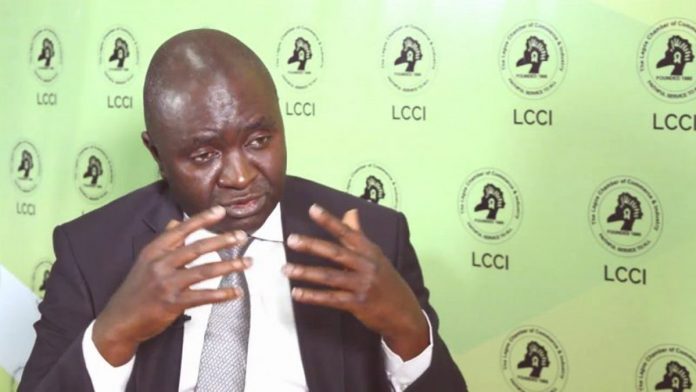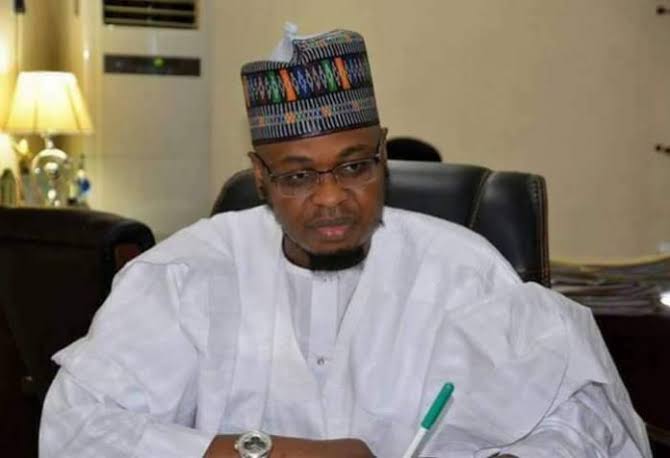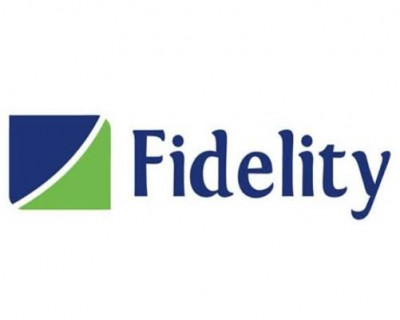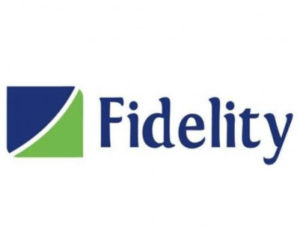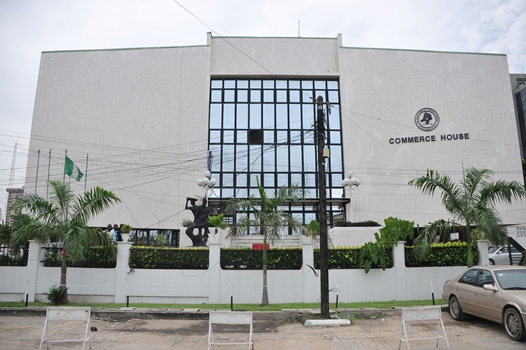
Lagos Chamber of Commerce and Industry, a body of oganised private sector operators in the country, has come out with a gloomy portrait of the country’s economy in the coming year 2021.
LCCI further projects that the out look for business in Nigeria in the coming year is gloomy and that the pace of economic recovery will remain subdued within the region of one percent in year 2021 in the absence of shocks.
The OPS body said in its latest report on Nigerian economy that the country’s recovery prospects depend largely on oil price and production level as GDP performance in recent quarters has significantly mirrored trends in both variables.
“The outlook for the business environment in 2021 is not very bright as there are no quick fixes for the structural issues and the desired regulatory and institutional reforms. The security situation as well requires new strategies and approaches. It is not clear what new strategies are in the works.
“Without bold policy pronouncements in this regard, constraints to the ease of doing business including FX shortage, escalating production costs, high regulatory costs, infrastructure inadequacies, and delayed cargo clearance, will persist into year 2021. These constraints will be more profound on businesses in the real economy. We believe the sluggish pace of recovery will continue to subdue consumer demand, albeit the impact on earnings performance will be disproportionate across sectors. While most MSMEs will struggle to survive in year 2021 amid unfavourable economic conditions, we expect most large corporates to demonstrate resilience in the coming year. We expect the economy to return to the path of positive growth in the second quarter of 2021 and this would expectedly impact on the macroeconomic environment which may ease some of the critical economic conditions currently impeding economic growth.
The chamber is also worried by the trajectory of inflation in Nigeria.
It said, “Headline inflation has been on the upward trajectory since August 2019. With average inflation rate at 12.89% between January and November 2020, much higher than full year average of 12.15% in 2018 and 11.39% in 2019, points to intense inflationary pressure in year 2020. Structural factors which constrain productivity across sectors (especially the real sector), decline in agricultural output, exchange rate depreciation, higher energy costs (PMS & power), security concerns in key food-producing states, covid-19 disruptions, flooding, climate change issues and high transportation cost were major inflation drivers in year 2020. These structural-induced factors are beyond the control of monetary authorities and have made it increasingly difficult for the CBN to achieve its primary objective of price stabilisation.
“Looking forward into year 2021, we expect headline inflation to remain elevated as the combination of food supply shocks, FX policies, higher energy costs, FX illiquidity, heightened insecurity in major food-producing states, will continue to mount pressure on domestic consumer prices. We believe a broad-based harmonisation of fiscal and monetary policies towards addressing the identified structural constraints will significantly help to moderate inflationary pressure in the medium term. Performance was largely weak across sectors in Q3-2020 due to the lingering effects of covid-19 disruptions. This trend will likely persist into Q4-2020 and Q1-2021 as the economy gradually recovers from the recession. However, a resurgence of covid-19 pandemic would cause another disruption to activities in oil and non-oil sectors. We expect ICT, financial institutions, and agriculture to drive growth in the non-oil sector in the short-term while the country’s commitment to OPEC+ agreement is expected to dampen recovery prospects of the oil sector”.
“Agricultural sector ironically demonstrated mild resilience with a positive growth of 1.39% in Q3-2020 despite the adverse impact of covid-19 disruptions, flooding, and insecurity on agricultural productivity. Agricultural productivity is usually robust in the third quarter being the harvest season, albeit output in year 2020 harvest season was muted as a result of covid-19 disruptions, flooding, and security issues. Elsewhere, the CBN tightened its FX policies by restricting access to FX for food and fertilizer importation, as a way of encouraging domestic production of agro-commodities. Looking forward, we see the CBN sustaining its intervention in the agricultural sector in year 2021 in a bid to boost domestic food production and minimize food supply gap. While ban on importation of rice, poultry and other agricultural commodities still subsist amid border reopening, however, there is risk of resurgence of smuggling of agricultural products into the country considering porous nature of Nigeria’s land borders. This combined with the commencement of AfCFTA could see Nigeria being a destination for imported food products in absence of adequate border monitoring measures. Additionally, heightened security concerns around the country, especially in Northern part of the country and resurgence in herder-farmer conflict in the Middle Belt, south west and south east, if unaddressed will hamper local food production in the near term. Nonetheless, we expect a modest growth performance in year 2021”.
As per the chamber, “Manufacturing sector was faced with several structural challenges, with adverse impact on growth performance. The sector has been struggling with growth in recent years due to tough operating conditions in the local business environment and has made most industry players less competitive in the domestic and regional markets. Manufacturing sector contracted by 8.8% at the peak of pandemic in Q2-2020 as coivd-19 disruptions, border closure and FX illiquidity subdued activities in the sector. However, the magnitude of contraction moderated to 1.51% in Q3-2020 following lifting of lockdown measures which supported resumption of activities in the sector. Nonetheless, lingering FX crisis was perhaps the most significant challenge for the sector in the outgoing year as most industry players found it increasingly difficult to access FX meant for importation of critical factor inputs. Moreover, increased pressure on consumer purchasing power threatened the earnings performance of manufacturers in the FMCG space, which propelled them to ‘sachetise’ their product portfolio in a bid to boost patronage.
“The reopening of the land borders should provide succour to the manufacturing sector even as the kick-off of AfCFTA serves avenue for manufacturers to penetrate new African markets. However, critical challenges such as FX scarcity, inconsistent FX policies, inefficient transport infrastructure, high production cost, weak consumer demand and the new competitiveness pressure foisted by the AfCFTA may dampen the recovery prospects of the sector in year 2021. We expect the CBN to sustain its intervention efforts in the manufacturing sector as part of measures to boost economic recovery. We see the CBN maintaining policies that supports credit extension to the real economy. The low interest environment in the money market favours big manufacturing players in terms of raising cheap capital but the business environment will remain challenging for manufacturing SMEs. In our view, credit flows to the manufacturing sector will fail to achieve desired outcomes without putting in place measures to address structural, bottlenecks in the ports and customs processes and other policy challenges to productivity. Thus, we see growth of the manufacturing sector being subdued in the near to medium term”.
Continuing It further said “performance of the trade sector has been very underwhelming before the covid-19 pandemic due to a number of constraints including weak consumer demand, exchange rate depreciation, FX liquidity crisis, ports and customs issues, land border closure and logistics challenges. These challenges were magnified by the global pandemic which pushed the sector into a deep recession with Q2-2020 and Q3-2020 growth numbers settling at -16.59% and -12.12% respectively. The abatement of the of the contraction in Q3-2020 could be attributed to the lifting of lockdown restrictions by the government and provision of relief measures aimed at supporting activities in the trade sector. Cross-border trade (formal and informal) was significantly suppressed in year 2020 following the closure of Nigeria’s land borders with consequent impact on businesses with exposure to West and Central African markets. Trade sector is expected to end the year 2020 in a negative growth territory as structural, policy and currency challenges stifling trade activities subsist. We expect weak disposable income, inadequate transport infrastructure, port inefficiencies, FX illiquidity, rising inflation and credit constraints (faced by informal SMEs) to dampen the recovery prospects of trade. Performance of the trade sector in year 2021 will be shaped by the direction of government policies regarding the AfCFTA. While the border reopening is expected to provide reprieve to trade sector”.
“Activities in the global and domestic economy in year 2020 were shaped by the COVID-19 19 pandemic and responses of various national governments, monetary authorities, private sector as well as international agencies in dealing with the health and economic effects of the pandemic. The Nigerian economy was already in a fragile and precarious position pre-pandemic. For context, the economy was faced with myriad challenges including subdued economic growth, falling income per capita, rising inflation, external vulnerabilities, escalating debt profile, insecurity, high unemployment incidence and weak investment confidence. These challenges were amplified by covid-19 induced disruptions as the economy lacked adequate buffers to supress the shock.
Several governments globally provided fiscal stimulus to support households, small businesses, and their economies generally, while central banks eased monetary policy conditions through large-scale purchases of financial assets and interest rate reduction to rescue their respective economies. Back home, the Federal Government developed the Nigerian Economic Sustainability Plan (NESP) with a total stimulus package of N2.3 trillion to address liquidity concerns of small & medium-sized businesses mostly impacted by the pandemic, provide financial support to the vulnerable segment of the populace, and create jobs, among others. Similarly, the Central Bank of Nigeria shifted its policy focus from price stability to the stimulation of economic recovery and growth in the year 2020 to complement the federal government’s fiscal stimulus in a bid to support business continuity and economic sustainability.
“More importantly, the adverse impact of the pandemic on the country’s fiscal resources propelled the Federal Government to undertake long-standing policy reforms including the partial removal of fuel subsidies, introduction of service-reflective tariff model, transmission of the Petroleum Industry Bill (PIB) to the National Assembly and reduced dependence of CBN financing of the budget deficit. However, the government is yet to demonstrate a consummate commitment to the effective implementation of these reforms. Towards the end of year 2020, there was strong momentum towards the discovery of covid-19 vaccine and this positive development is expected to strengthen global economic rebound in year 2021 in the absence of any major shocks.
“Economic discourse globally and domestically will centre on recovery in the coming year, albeit the resurgence of the pandemic is a threat to global economic recovery. The Nigerian economy risks a further perpetuation of the current recession if the pandemic persists into Q1-2021. To foster economic resilience in year 2021, quick implementation of structural reforms including review of the foreign exchange management framework and significant investment critical infrastructural developmental projects are imperative. Looking forward, the following will shape the outlook for 2021: (a) Covid-19 resurgence (b) African Continental Free Trade Area (c) Power sector reforms (d) Finance Bill 2020 (e) Passage of Petroleum Industry Bill (f) External Sector trends and (g) new national economic development plan to shape government’s policy direction in the coming year.
“The Nigerian economy grew by 1.87% in real terms in Q1-2020, and then contracted by 6.1% and 3.62% in Q2-2020 and Q3-2020, respectively. The economy slipped into a technical recession in Q3-2020 after a two consecutive quarterly decline in national output, and this marks the second recession since the 2014 commodity price shock. The moderation in the magnitude of contraction in Q3-2020 could be attributed to lifting of global and domestic COVID-19 19 induced lockdown and restriction measures which consequently supported the gradual resumption of the economic activities.
“More importantly, the third quarter economic performance was constrained by significantly lower oil production, which fell by 7.7% from 1.8 million b/d in Q2-2020 to 1.67 million b/d in Q3-2020 following Nigeria’s compliance to the production reduction agreement of the Organization of Petroleum Exporting Countries and allies (OPEC+). We note that in Q3-2020, the economy was confronted with several challenges including subdued business & commercial activities across various sectors (evidenced by PMI data trend); significant FX pressures (evidenced by widening premium between official and parallel market rates); revenue pressure from oil and non-oil sources, sustained external pressure (evidenced by sustained depletionin official reserves), inflationary pressure, subdued purchasing power, weak employment levels, worsening internal security situation and weak investor confidence. Third quarter performance was largely tenuous across sectors as 27 sectors ended up in recession; two sectors contracted; four sectors reported moderation in growth and 13 sectors reported expansion in the reference quarter. The oil sector contracted sharply by 13.89% in Q3-2020 as against 6.63% decline in Q2-2020 due to Nigeria’s adherence to OPEC+ declaration of cooperation aimed at rebalancing the global energy market. The country was compelled to make compensatory cuts in July and September as a corrective measure for exceeding production targets in May and June. As a result, oil production fell to 1.67 million b/d in Q3-2016, its lowest level since Q4-2016, an indication that Nigerian economy is more sensitive weakening oil production than prices.
“The non-oil sector reported a less severe contraction of 2.51% in Q3-2020 compared with 6.05% in Q2-2020 following the easing of lockdown. We note that although lockdown restrictions were significantly eased in Q3-2020, but few sectors such as aviation, education and hospitality were under lockdown for most part of Q3-2020, even as activities were relatively weak in sectors where lockdown were relaxed. Although lockdown have been eased completely, economic and business activities remain weak reflective in PMI Readings. While GDP growth is usually robust in Q4-2020 due to festive-related spending, year 2020 will likely be an exception as we expect rising pressure on consumer incomes and lingering FX pressure to dampen recovery prospects in Q4-2020. Additionally, resurgence in covid-19 pandemic coupled with relatively lower oil production and price as well as the disruptive impact of the EndSARS protest are the major downside risks to economic recovery prospects in Q4-2020. In essence, we expect GDP Growth number for Q4-2020 to remain subdued. Considering Nigeria’s output performance between Q1-2020 and Q3-2020, We expect the economy to end year 2020 in a negative growth territory within the region of -2% and -1%. The magnitude of contraction in year 2020 will be more severe compared to year 2016’s annual contraction of 1.62%.
“Our position resonates with projections by the World Bank and International Monetary Fund (IMF) that output growth will sharply contract to its lowest level since 1980. The economy was faced with positive but sluggish growth before the pandemic with real GDP growth averaging 1.94% between Q2-2017 and Q1-2020, much below population growth rate of 2.6%. While recovery to growth trajectory is expected to take full course most likely in Q2-2021 due to base effect of Q2-2020 when output contracted steeply by 6.1%. We expect the pace of recovery to remain subdued within the region of one percent in year 2021 in the absence of shocks. In our view, Nigeria’s recovery prospects depend largely on oil price and production level as GDP performance in recent quarters has significantly mirrored trends in both variables. It is instructive to note that Q2-2017 growth recovery was facilitated by rebound in international oil prices rather than government’s intervention efforts. We see a similar type of recovery in year 2021. However, shocks including resurgence in covid-19 pandemic and significant oil price volatility are the major downside risks.
“The business community witnessed two major disruptions in year 2020 – covid-19 pandemic and EndSARS protest. The pandemic through its various containment measures disrupted business and commercial activities nationwide. Our findings showed that MSMEs with active presence in Lagos lost at least N2.7 billion in revenue to the lockdown. The sharp naira exchange rate depreciation coupled with sustained acceleration in domestic prices escalated the cost of production as well as operating costs for investors in the economy even as revenue was pressured by unfavourable economic conditions. The fiscal and monetary authorities as well as the coalition of private sector players provided several relief measures to cushion the impact of the pandemic on the business community. Business activities rebounded modestly in Q3-2020 following the relaxation of various lockdown measures.
“However, the major challenges faced by the business community in the outgoing year include – liquidity crisis in the foreign exchange market, sharp exchange rate depreciation, high energy & production cost, ports congestion, cumbersome and burdensome customs processes, insecurity, inconsistent government policies, regulatory uncertainties, land border closure and Apapa traffic gridlock”.









